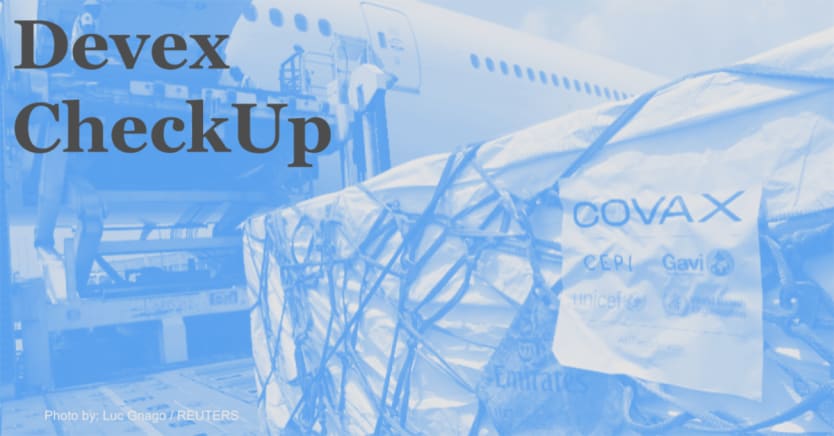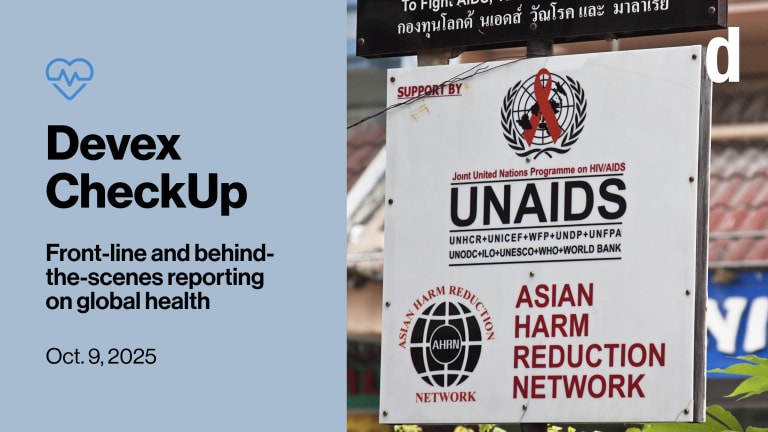
Global leaders convene today for the second Global COVID-19 Summit in hopes they can revive the energy around the COVID-19 response amid slowing vaccination efforts, plunging testing rates, concerns about inequitable access to antiviral pills, and failed discussions around vaccine intellectual property at the World Trade Organization.
• The virtual global pandemic response summit — hosted by the United States, Belize, Germany, Indonesia, and Senegal — aims to secure new funding for the ongoing COVID-19 response and for preparedness for future pandemics, as well as work to ensure vaccines, tests, and treatments reach vulnerable populations.
This is a preview of Devex CheckUp
Sign up to this newsletter for exclusive global health news and insider insights, in your inbox every Thursday.
• Organizers of the summit expect $10 billion to be committed by countries and donors for increasing access to vaccines and $3 billion for access to therapeutics and oxygen.
• But the United States is not expected to bring additional funding to the table. The U.S. Congress has failed to approve $5 billion in funding for the global COVID-19 response, which would be used to help deliver vaccines and other lifesaving tools. On Tuesday, Congress stripped pandemic response funding out of a Ukraine assistance package. U.S. President Joe Biden said he had “been informed by Congressional leaders in both parties that such an addition would slow down action on the urgently needed Ukrainian aid.”
• Despite these expected shortfalls, there are hopes for a “more pragmatic and explicit approach towards vaccination, diagnosis, and treatment in the global south” arising from this summit, Javier Guzman, director of global health policy at the Center for Global Development, tells Sara Jerving. He says that health advocates are also expecting the U.S. to mobilize support for pandemic preparedness through the Financial Intermediary Fund, which will be housed at the World Bank.

• Biden hosted the first global summit last September. A series of global targets were set, but according to an analysis by COVID Global Accountability Platform, countries are off track on vaccination coverage, testing rates, and access to therapeutic goals.
• The U.S. has led the COVID-19 vaccination donation efforts, committing to share 1.2 billion doses. At the last summit, Biden committed to deliver these doses by September 2022. But only 45% have been shipped so far.
• Separate from the summit, ACT-Accelerator has asked for $16.8 billion in grants for its activities through September, but has raised less than $3 billion.
+ Stay tuned for Sara’s full story on the summit.
+ Devex @ WHA 75 gives you a front-row seat to the major decision points at the 75th World Health Assembly and an opportunity to learn from the experts about how current and future initiatives can protect the world from global health threats. Join us on May 25.
Breathing easy
COVID-19 created a new demand for medical oxygen — with some countries seeing a tenfold increase. Now some fear that donors who jumped on the bandwagon of funding oxygen innovation will lose interest, rather than extending and scaling solutions to supply and delivery problems in the industry.
Patricia Coffey, a senior program officer at Seattle-based global health NGO PATH, tells our colleague Catherine Cheney about the dangers of the “funding cliff.”
“You’ve got a great concept,” she says, “but no one wants to fund the hard part, which is figuring out the regulatory process, finding an industry partner, doing the tech transfer, actually entering the market, and then selling it.”
Read: Can COVID-19 breathe new life into medical oxygen innovations? (Pro)
+ A Devex Pro subscription brings you essential analysis, data-driven funding insights, and access to the world’s largest global development job board. Not yet a Pro subscriber? Try it for free for 15 days.
‘The only game in town’
A compromised TRIPS deal that was tabled at the WTO last week failed to break the stalemate on the issue of COVID-19 vaccine IP. The agreement, which emerged from discussions among the so-called Quad — comprised of the European Union, the United States, South Africa, and India — drew significant criticism on what it does not include: among other things, the need to waive IP protections for therapeutics and diagnostics, as well as technology transfers.
Even so, WTO officials will press for a resolution ahead of a long-delayed Ministerial Conference in June, Andrew Green reports for Devex.
Read: TRIPS waiver compromise tabled at WTO finds few takers
Smoke (green) screen
WHO and tobacco industry watchdog STOP launched a new report today calling out the industry’s practice of greenwashing — for allegedly portraying itself as environmentally responsible when it’s not.
• The Climate Disclosure Project, an international nonprofit helping companies disclose their environmental impact, has awarded Philip Morris International “A-List status” for its corporate action on climate change since 2014, meaning it’s among the leaders in the field. But the environmental, social, and governance rankings and awards tobacco companies receive are questionable, according to the report. Analysts say ESG criteria employed by organizations generally do not consider the sustainability of a company’s actual products or services.
• Cigarettes and new electronic products are also causing environmental harm — from deforestation to waste. The 32 million metric tons of tobacco leaf grown each year to produce 6 trillion cigarettes emit and use an equivalent of over 80 million metric tons of carbon dioxide. Meanwhile, an estimated 1.5 billion hectares of forests worldwide have been lost since the 1970s due to tobacco growing and curing.
+ Watch this space for Jenny’s full reporting.
Big picture
Last week, WHO released the COVID-19 excess mortality estimates, which are yet again being refuted by the Indian government.
Meanwhile, on Monday, a team of Reuters photographers — including the late Danish Siddiqui who was killed by the Taliban in Afghanistan in July 2021 — won a Pulitzer Prize for capturing images of “COVID’s toll in India that balanced intimacy and devastation, while offering viewers a heightened sense of place,” reiterating once again the cost of the pandemic borne by ordinary Indians.
What we’re reading
Chinese social media platforms block WHO chief Tedros’ remarks on China’s “zero-COVID” policy. [Reuters]
U.S. government contractor Emergent BioSolutions hid evidence of quality control problems in manufacturing millions of COVID-19 vaccines at its Baltimore plant, a new report shows. [The New York Times]
Norway has discarded over 137,000 doses of COVID-19 vaccines, and plans to dispose of more if global demand continues to decline. [ABC News]
Sara Jerving contributed reporting to this edition of Devex CheckUp.










